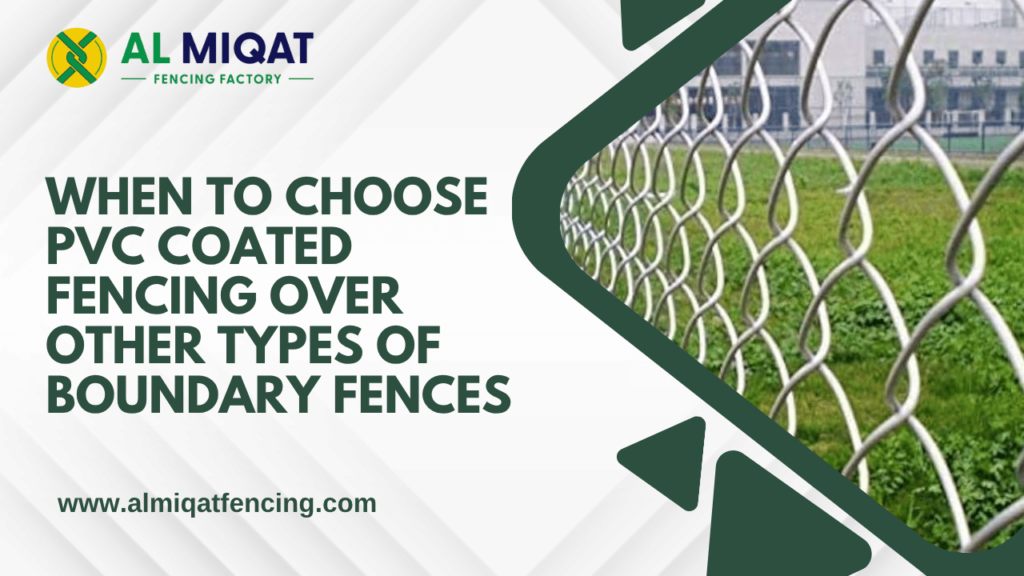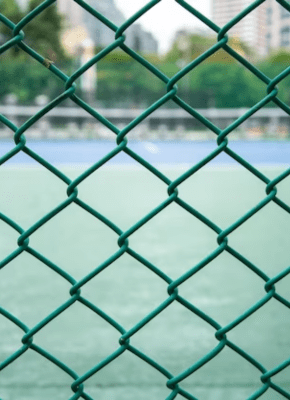Al Miqat Fencing Factory is a leading manufacturer and supplier of high-performance fencing solutions, serving clients across industrial, agricultural, residential, and commercial sectors. Our product range includes PVC coated chain link fencing, galvanized fencing, welded mesh panels, barbed wire, shade netting, and more. At Al Miqat, we are committed to delivering quality, durability, and expert support to help you secure your spaces with confidence.
Introduction
Boundary fencing is a crucial aspect of property management—whether it’s for security, privacy, animal containment, or defining a perimeter. With so many fencing types available today, from barbed wire and welded mesh to concrete walls and chain link fencing, the choice can often be overwhelming.
Among these options, PVC coated fencing has gained popularity for its combination of strength, weather resistance, and aesthetic appeal. But is it always the right choice?
In this blog, we’ll help you understand when and why to choose PVC coated fencing over other boundary fence types. By comparing use cases, environmental conditions, and long-term value, you’ll be better equipped to make an informed decision for your next fencing project.
What is PVC Coated Fencing?
PVC coated fencing typically refers to chain link or welded wire mesh fencing that has been coated with a protective layer of polyvinyl chloride (PVC). This coating serves several purposes:
- Adds a smooth finish for safety
- Enhances corrosion resistance
- Improves aesthetic appearance
- Increases durability in extreme climates
PVC coatings are commonly applied over galvanized steel, combining the rust resistance of zinc with the UV and chemical protection of plastic.
Now, let’s explore the situations where PVC coated fencing is the superior choice.
- When Weather Resistance Is a Top Priority
In environments where fencing is exposed to rain, humidity, coastal air, or extreme sunlight, rust and corrosion become major concerns. While galvanized fencing resists rust fairly well, PVC coated fencing offers an additional layer of protection that makes it ideal for:
- Coastal areas with salty air
- Tropical climates with heavy rains
- Industrial areas with chemical exposure
- Farms and animal pens, where urine and waste can be corrosive
PVC coating acts as a barrier that shields the metal core from moisture and oxidation, greatly extending the fence’s lifespan in such conditions.
- When Safety is Critical
Safety is a key factor in fencing—especially when enclosing children, pets, or livestock. Uncoated wire mesh or chain link fencing can sometimes have sharp edges or rough surfaces, which pose a risk of cuts or scratches.
PVC coated fencing offers a smooth, rounded surface that reduces the likelihood of injury. That’s why it’s widely used in:
- School playgrounds
- Residential gardens
- Kennels and pet enclosures
- Animal shelters or zoos
The added coating also prevents the wire from heating up too much under the sun, reducing risk during contact.
- When Aesthetics Matter
If you are fencing a residential property, sports facility, school, or public park, how the fence looks can be almost as important as how it functions. Standard metal fences can look harsh or industrial, whereas PVC coated fences are available in colors like green, black, or white, blending more naturally with the surroundings.
Use PVC coated fencing when you want a cleaner, more polished appearance that complements landscaping, architecture, or the general environment.
- When Long-Term Value Matters More Than Upfront Cost
PVC coated fencing may come at a slightly higher initial cost than bare galvanized wire or traditional fencing options. However, this initial investment is balanced out by lower maintenance costs and longer service life.
With a PVC coated fence, you’ll spend less on repainting, rust repair, or replacements over time. It’s ideal for projects where long-term reliability is more important than upfront savings—such as:
- Government infrastructure projects
- High-traffic industrial sites
- Institutional facilities
- Commercial perimeters
This makes it a more cost-effective option in the long run, especially in demanding environments.
- When Versatility and Customization Are Needed
PVC coated fences are available in various:
- Heights (from 1 meter to 3 meters and beyond)
- Mesh sizes (depending on the application)
- Wire gauges (for light to heavy-duty use)
- Colors (for blending or visibility)
This makes PVC coated fencing a flexible solution for a wide range of applications—farms, factories, gardens, sports fields, or even temporary event barriers. You can choose specifications that best match your project’s requirements in terms of strength, visibility, or visual impact.
- When You Need a Fence That’s Easy to Maintain
Unlike timber fencing, which may warp, crack, or rot over time, PVC coated fencing is resilient and easy to clean. You don’t need regular painting, sealing, or treatments. Just an occasional rinse with water is enough to keep it looking good and functioning properly.
This is particularly beneficial for:
- Remote installations, where maintenance is difficult
- Busy facilities, where time and resources are limited
- Public areas, where cleanliness and appearance must be maintained with minimal effort
When PVC Coated Fencing May Not Be Ideal
While PVC coated fencing is suitable for most applications, there are a few situations where another type of fencing might be preferred:
- High-security zones may require concrete walls, steel panels, or anti-climb fencing with razor wire
- Budget-limited projects might go for standard galvanized chain link if aesthetic or long-term durability is not critical
- Temporary fencing solutions for short-term events may opt for modular barriers or fabric mesh
However, for the majority of boundary fencing needs, especially where safety, weather resistance, and appearance matter, PVC coated fencing remains one of the most versatile and effective solutions available.
Conclusion
Choosing the right boundary fencing comes down to understanding your project’s specific goals, environment, and long-term expectations. When it comes to a balance of durability, safety, appearance, and value, PVC coated fencing stands out as a reliable and future-proof option.
Whether you’re fencing a school, factory, farm, villa, or commercial property, Al Miqat Fencing Factory can help you find the ideal PVC coated fencing solution. We offer custom sizes, high-quality coatings, and expert advice, ensuring you get a product that fits your needs and exceeds your expectations.
Contact us today to learn more about our range of PVC coated fencing or request a tailored quote for your next project. With Al Miqat, your boundaries are always secure—and built to last.


